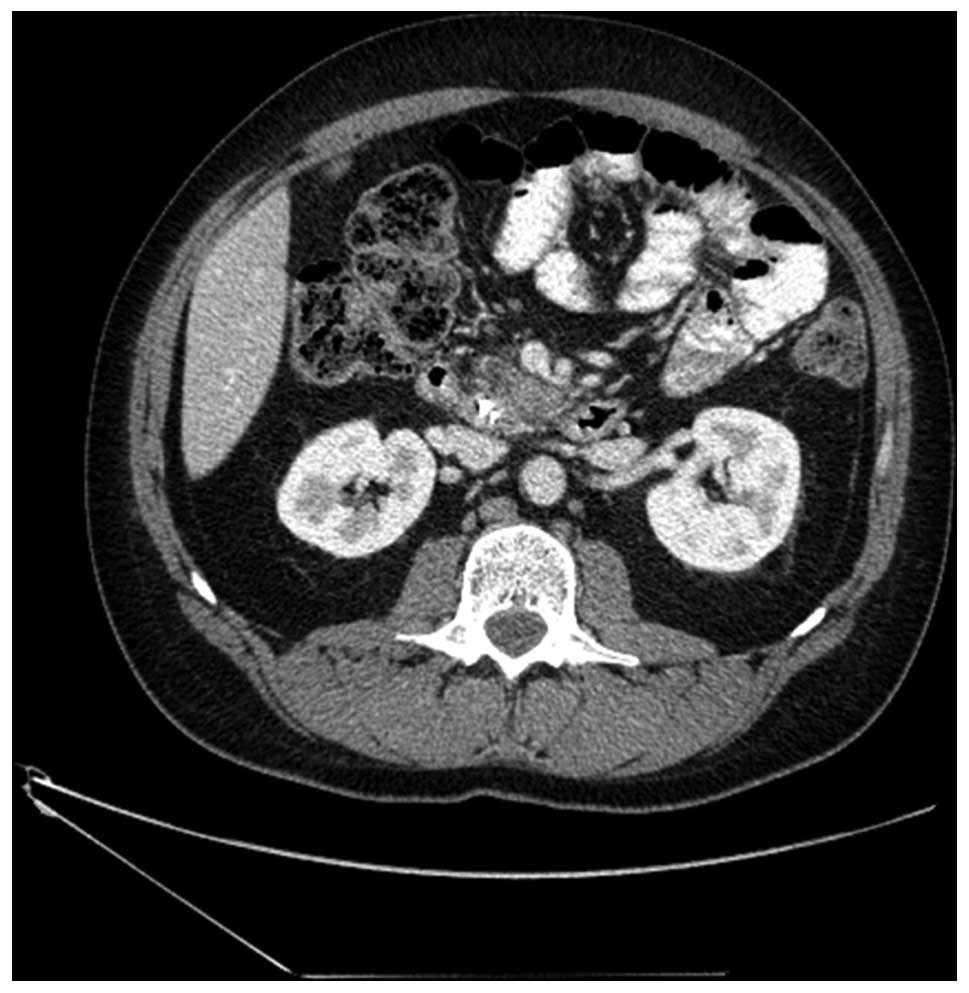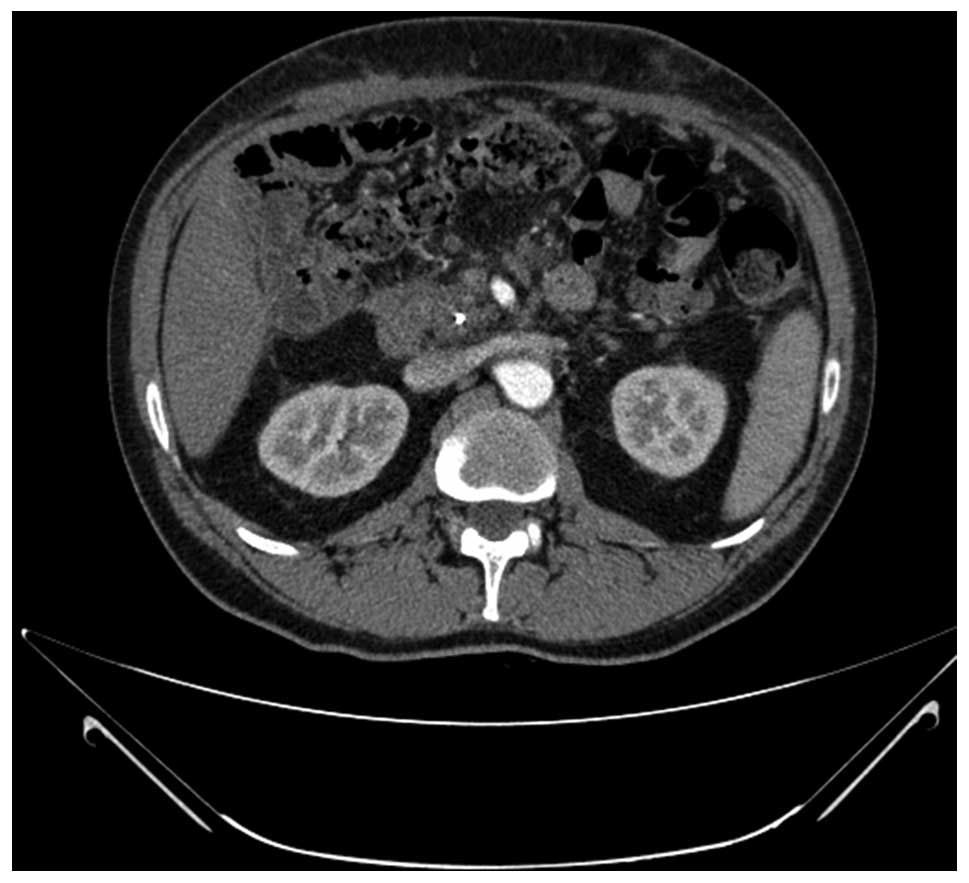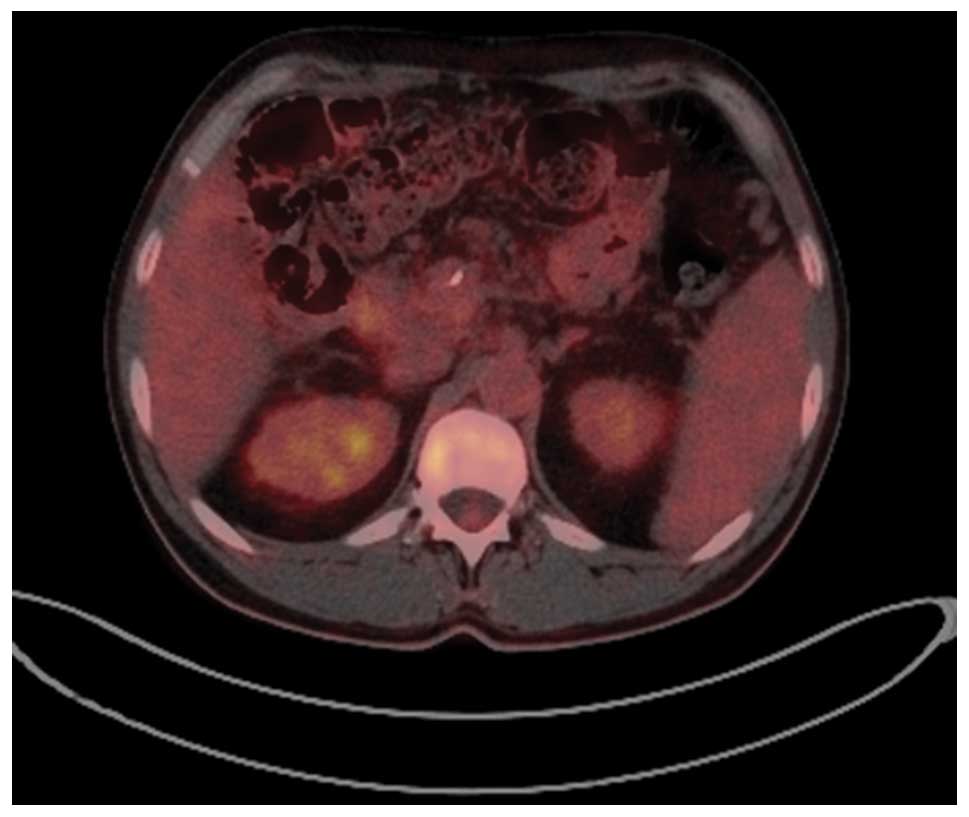|
1
|
Ferlay J, Parkin DM and Steliarova-Foucher
E: Estimates of cancer incidence and mortality in Europe in 2008.
Eur J Cancer. 46:765–781. 2010. View Article : Google Scholar : PubMed/NCBI
|
|
2
|
Malvezzi M, Bertuccio P and Levi F: LaV
ecchia C and Negri E: European cancer mortality predictions for the
year 2012. Ann Oncol. 23:1044–1052. 2012. View Article : Google Scholar : PubMed/NCBI
|
|
3
|
Koorstra JB, Hustinx SR, Offerhaus GJ and
Maitra A: Pancreatic carcinogenesis. Pancreatology. 8:110–125.
2008. View Article : Google Scholar : PubMed/NCBI
|
|
4
|
Andreotti G and Silverman DT: Occupational
risk factors and pancreatic cancer: a review of recent findings.
Mol Carcinog. 51:98–108. 2012. View
Article : Google Scholar : PubMed/NCBI
|
|
5
|
Shrikhande SV, Barreto SG, Goel M and Arya
S: Multimodality imaging of pancreatic ductal adenocarcinoma, a
review of the literature. HPB (Oxford). 14:658–668. 2012.
View Article : Google Scholar : PubMed/NCBI
|
|
6
|
Picchio M, Giovannini E, Passoni P, et al:
Role of PET/CT in the clinical management of locally advanced
pancreatic cancer. Tumori. 98:643–651. 2012.PubMed/NCBI
|
|
7
|
Moore MJ, Goldstein D, Hamm J, et al:
National Cancer Institute of Canada Clinical Trials Group:
Erlotinib plus gemcitabine compared with gemcitabine alone in
patients with advanced pancreatic cancer: a phase III trial of the
National Cancer Institute of Canada Clinical Trials Group. J Clin
Oncol. 25:1960–1966. 2007. View Article : Google Scholar : PubMed/NCBI
|
|
8
|
National Institutes of Health: Common
Terminology Criteria for Adverse Events (CTCAE). Version 4.0 May
28. 2009.http://evs.nci.nih.gov/ftp1/CTCAE/CTCAE_4.03_2010-06-14_QuickReference_5x7.pdf
|
|
9
|
Burris HA III, Moore MJ, Andersen J, Green
MR, Rothenberg ML, Modiano MR, Cripps MC, Portenoy RK, Storniolo
AM, Tarassoff P, Nelson R, Dorr FA, Stephens CD and Von Hoff DD:
Improvements in survival and clinical benefit with gemcitabine as
first-line therapy for patients with advanced pancreas cancer. a
randomized trial. J Clin Oncol. 15:2403–2413. 1997.PubMed/NCBI
|
|
10
|
Burris HA III: Recent updates on the role
of chemotherapy in pancreatic cancer. Semin Oncol. 32(4 Suppl 6):
S1–S3. 2005. View Article : Google Scholar : PubMed/NCBI
|
|
11
|
Borja-Cacho D, Jensen EH, Saluja AK,
Buchsbaum DJ and Vickers SM: Molecular targeted therapies for
pancreatic cancer. Am J Surg. 196:430–441. 2008. View Article : Google Scholar : PubMed/NCBI
|
|
12
|
Kleespies A, Jauch KW and Bruns CJ:
Tyrosine kinase inhibitors and gemcitabine, new treatment options
in pancreatic cancer? Drug Resist Updat. 9:1–18. 2006. View Article : Google Scholar : PubMed/NCBI
|
|
13
|
Longo R, Cacciamani F, Naso G and
Gasparini G: Pancreatic cancer, from molecular signature to target
therapy. Crit Rev Oncol Hematol. 68:197–211. 2008. View Article : Google Scholar : PubMed/NCBI
|
|
14
|
Starling N, Neoptolemos J and Cunningham
D: Role of erlotinib in the management of pancreatic cancer. Ther
Clin Risk Manag. 2:435–445. 2006. View Article : Google Scholar : PubMed/NCBI
|
|
15
|
Vickers MM, Powell ED, Asmis TR, et al:
Comorbidity, age and overall survival in patients with advanced
pancreatic cancer - results from NCIC CTG PA.3: a phase III trial
of gemcitabine plus erlotinib or placebo. Eur J Cancer.
48:1434–1442. 2012. View Article : Google Scholar : PubMed/NCBI
|
|
16
|
da Cunha Santos G, Dhani N, Tu D, et al:
Molecular predictors of outcome in a phase 3 study of gemcitabine
and erlotinib therapy in patients with advanced pancreatic cancer:
National Cancer Institute of Canada Clinical Trials Group Study
PA.3. Cancer. 116:5599–5607. 2010. View Article : Google Scholar : PubMed/NCBI
|
|
17
|
Danese MD, Reyes C, Northridge K, Lubeck
D, Lin CY and O'Connor P: Budget impact model of adding erlotinib
to a regimen of gemcitabine for the treatment of locally advanced
nonresectable or metastatic pancreatic cancer. Clin Ther.
30:775–784. 2008. View Article : Google Scholar : PubMed/NCBI
|
|
18
|
Klapdor R, Klapdor S and Bahlo M:
Combination therapy with gemcitabine (GEM) and erlotinib (E) in
exocrine pancreatic cancer under special reference to RASH and the
tumour marker CA19-9. Anticancer Res. 32:2191–2197. 2012.PubMed/NCBI
|
|
19
|
Feliu J, Borrega P, León A, et al: Phase
II study of a fixed dose-rate infusion of gemcitabine associated
with erlotinib in advanced pancreatic cancer. Cancer Chemother
Pharmacol. 67:215–221. 2011. View Article : Google Scholar : PubMed/NCBI
|
|
20
|
Iyer NIKRV, Tan W, Litwin A, Starostik P,
Levea C, Tucker C, Ma W, Fakih M and Adjei AA: A phase II study of
erlotinib in patients (PTS) with advanced pancreatic cancer (APC)
who are refractory to gemcitabine (G). ASCO Gastrointestinal
Cancers Symposium abstract. 258:2010.
|
|
21
|
Heinemann V, Haas M and Boeck S: Systemic
treatment of advanced pancreatic cancer. Cancer Treat Rev.
38:843–853. 2012. View Article : Google Scholar : PubMed/NCBI
|
|
22
|
Carbonell S, Espinosa J, Zarco A, et al:
Complete pathological response after chemotherapy alone in a
patient with pancreatic adenocarcinoma. Pancreas. 41:657–659. 2012.
View Article : Google Scholar : PubMed/NCBI
|
|
23
|
Renouf DJ, Tang PA, Hedley D, Chen E,
Kamel-Reid S, Tsao MS, Tran-Thanh D, Gill S, Dhani N, Au HJ, Wang L
and Moore MJ: A phase II study of erlotinib in gemcitabine
refractory advanced pancreatic cancer. Eur J Cancer. 50:1909–1915.
2014. View Article : Google Scholar : PubMed/NCBI
|
|
24
|
Abdel-Wahed MM, Asaad NY and Aleskandarany
M: Expression of matrix metalloproteinase-2 in renal cell
carcinoma. J Egypt Natl Canc Inst. 16:168–177. 2004.PubMed/NCBI
|
|
25
|
Riely GJ, Politi KA, Miller VA and Pao W:
Update on epidermal growth factor receptor mutations in non-small
cell lung cancer. Clin Cancer Res. 12:7232–7241. 2006. View Article : Google Scholar : PubMed/NCBI
|
|
26
|
Weiss GA, Rossi MR, Khushalani NI, et al:
Evaluation of phosphatidylinositol-3-kinase catalytic subunit
(PIK3CA) and epidermal growth factor receptor (EGFR) gene mutations
in pancreaticobiliary adenocarcinoma. J Gastrointest Onco. 4:20–29.
2013.
|
|
27
|
Wacker B, Nagrani T, Weinberg J, Witt K,
Clark G and Cagnoni PJ: Correlation between development of rash and
efficacy in patients treated with the epidermal growth factor
receptor tyrosine kinase inhibitor erlotinib in two large phase III
studies. Clin Cancer Res. 13:3913–3921. 2007. View Article : Google Scholar : PubMed/NCBI
|
|
28
|
Ballehaninna UK and Chamberlain RS: The
clinical utility of serum CA 19-9 in the diagnosis prognosis and
management of pancreatic adenocarcinoma: An evidence based
appraisal. J Gastrointest Oncol. 3:105–119. 2012.PubMed/NCBI
|
|
29
|
Boeck S, Jung A, Laubender RP, et al: KRAS
mutation status is not predictive for objective response to
anti-EGFR treatment with erlotinib in patients with advanced
pancreatic cancer. J Gastroenterol. 48:544–548. 2013. View Article : Google Scholar : PubMed/NCBI
|
|
30
|
Boeck S, Jung A, Laubender RP, et al: EGFR
pathway biomarkers in erlotinib-treated patients with advanced
pancreatic cancer: translational results from the randomised,
crossover phase 3 trial AIO-PK0104. Br J Cancer. 108:469–476. 2013.
View Article : Google Scholar : PubMed/NCBI
|
|
31
|
Renouf D and Moore M: Evolution of
systemic therapy for advanced pancreatic cancer. Expert Rev
Anticancer Ther. 10:529–540. 2010. View Article : Google Scholar : PubMed/NCBI
|

















